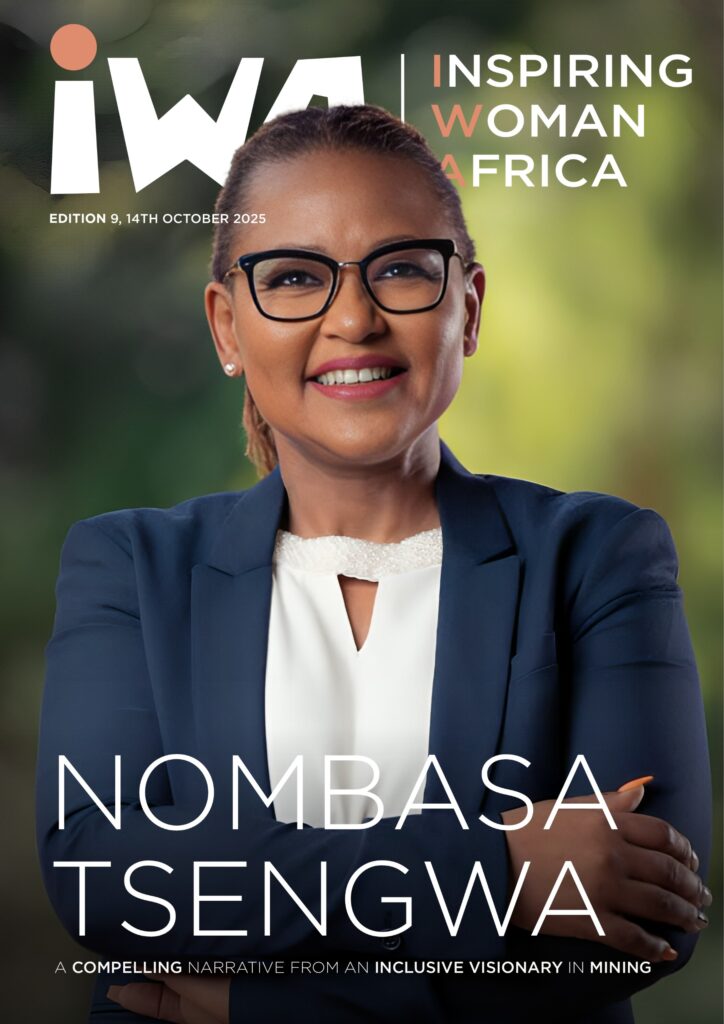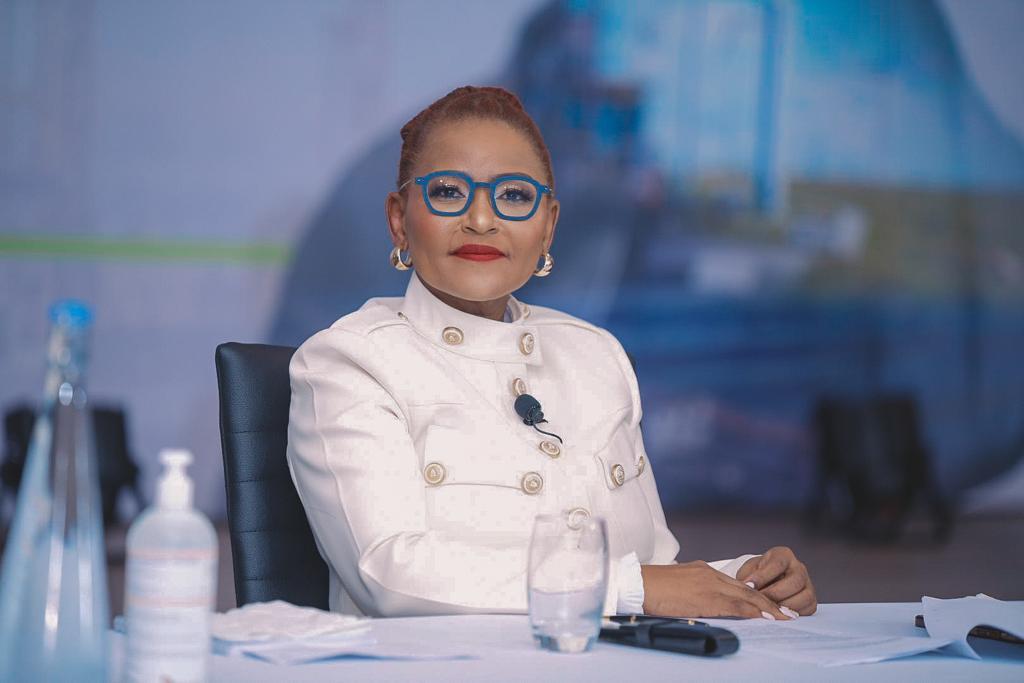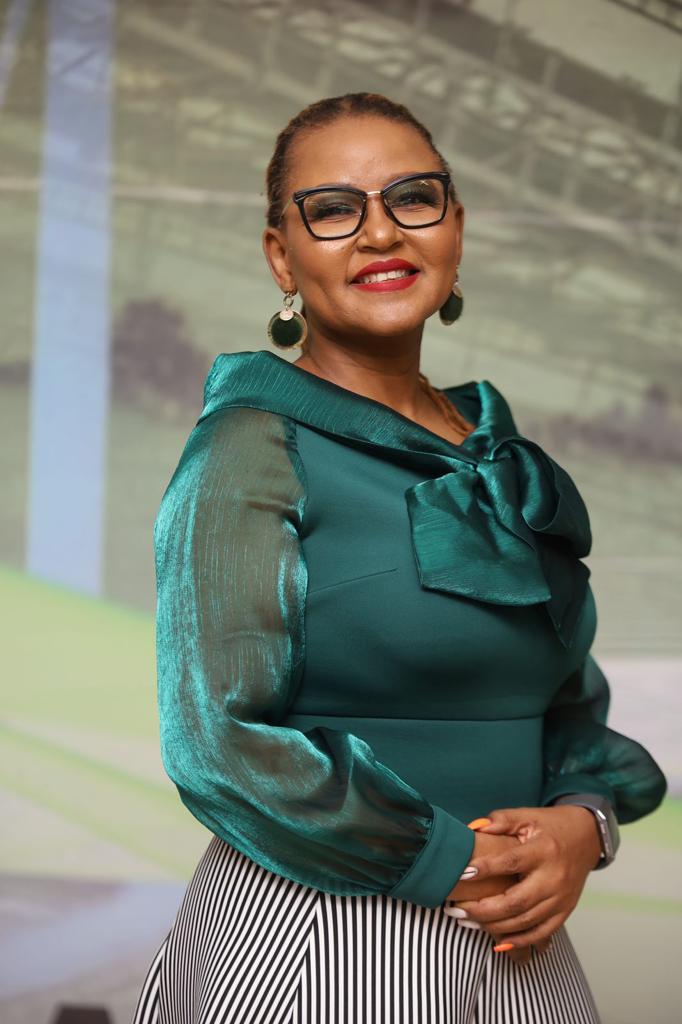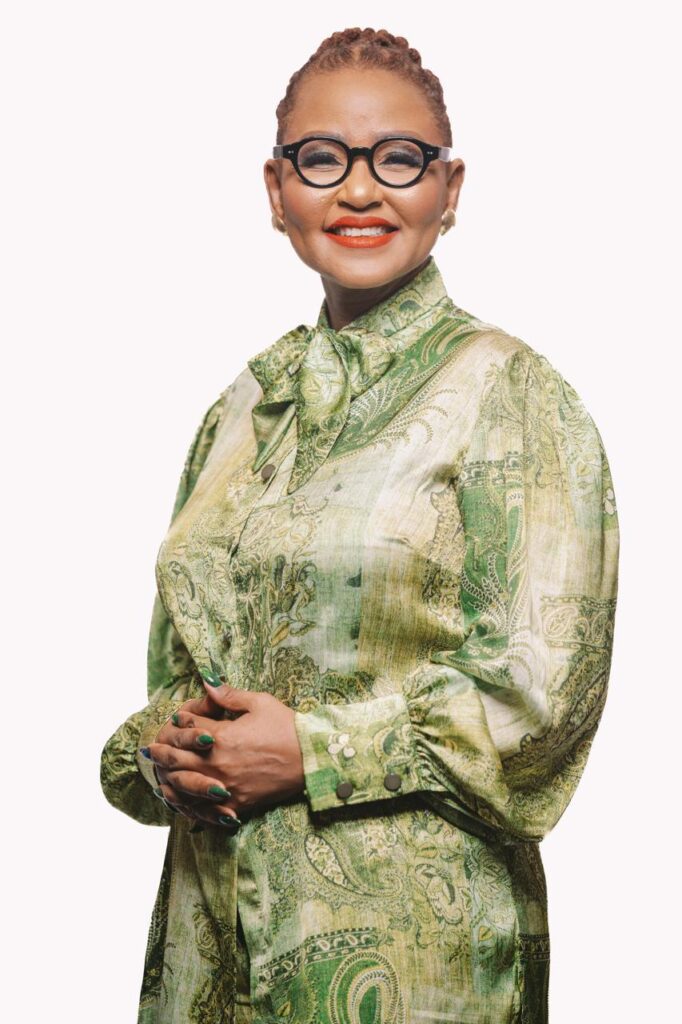
Nombasa Tsengwa (Dr) is ranked as a leading LinkedIn content creator with resounding influence. She is a pioneering mining investor, an advocate of ownDNALeadershipTM , the former President of the Minerals Council, and past CEO of Exxaro Resources, a major South African listed mining company. As CEO and in previous roles, including Executive Head of Coal Operations and MD of Minerals, she led strategic investments exceeding R17 billion and helped achieve an average ROCE of 25% since 2017. She spearheaded Exxaro’s diversification into future-facing commodities such as copper and manganese, aligning with the company’s Sustainable Growth and Impact Strategy and its ambition to achieve carbon neutrality by 2050. Under her leadership, Exxaro ranked among the JSE’s top 5 performers and expanded its operational and geographical footprint, becoming a model for transformation, innovation, and value creation. These experiences shaped her thinking about what true, lasting impact requires – resilience, courage, vision, and a commitment to a purpose beyond profit. They also prepared her for her next chapter: L’inyathelo.
A multiple award winner and recognised gender icon in mining. She is acclaimed to have championed transformation, responsible growth, and sustainable development throughout her career.
She is the Founder and CEO of L’inyathelo.com, a strategic investment platform focused on unlocking value in the resources and energy ventures, a global movement of organic leaders in response to African challenges, while fostering sustainable growth. Nombasa is a sought-after voice on leadership, especially resilience, transformation, growth, and industry innovation. She is a proud finisher of 9 consecutive Comrades Marathons.
When Inspiring Woman Africa (IWA) Magazine began researching women whose leadership has shaped the trajectory of African industries, one name kept surfacing in our findings – Dr Nombasa Tsengwa. Her story was impossible to ignore, not only for its scale and depth, but for the silence that has lately surrounded it.
Our editorial team’s research led us to the extensive governance commentaries authored by Seipati Asante Mokhuoa, whose work has consistently illuminated stories of women in leadership that deserve global attention. We uncovered a narrative that demanded to be told – a story of a woman who gave twenty-three years of her life to one institution, only for her to leave under the circumstances that she did.
Dr Tsengwa’s exit from Exxaro Resources, following allegations of misconduct and breaches of governance, represents an unsettling episode in recent corporate history. How does a career defined by decades of performance, transformation, and veracity end in abrupt suspension and resignation? What kind of misconduct could possibly erase twenty-three years of service, credibility, and achievement? And perhaps, noteworthy, – if this were a man, would the outcome have been the same?
What Dr Tsengwa walked away from cannot be quantified in financial terms. It was a legacy – the culmination of a lifetime of work, of pioneering leadership in a significant sector in South Africa.
This feature is the result of an inquiry, to also know the experiences of a woman who was willing to share her story with IWA, on what women leaders at the pinnacle of power go through, and what systemic reforms are required to ensure that excellence is never sacrificed at the altar of perception or politics.
Inspiring Woman Africa reached out to Dr Nombasa Tsengwa for her reflections on the events that shaped her exit from Exxaro Resources and the journey that preceded it. True to form, she responded with composure, candour, and an unwavering belief in purpose.
Her words reveal not bitterness, but perspective — a rare glimpse into the heart of a leader who has weathered public scrutiny with grace. In her own voice, she speaks about leadership, loss, and what comes after twenty-three years of service are reduced to a headline. We present our exclusive interview with her.
IWA’S QUESTIONS TO DR NOMBASA TSENGWA
After twenty-three years of dedicated service and leadership at Exxaro, what do you believe truly led to your sudden suspension and eventual exit?
When I assumed the role of CEO on 1 August 2022, I was deeply moved by the overwhelming energy and excitement that filled the room. That Monday morning felt electric — a true celebration. From heartfelt speeches at Board level to those from employees on the ground, it was clear the moment marked a historic chapter in Exxaro’s journey. What resonated most was not the fanfare, but the sentiment: ‘The first woman to lead the organisation — someone who rose through the ranks, earned our respect, and made us proud. We are behind her all the way.’ I believed that wholeheartedly. But soon, reality set in. Despite the title, I found myself without the authority to execute the mandate entrusted to me — a mandate my predecessors had exercised freely. Ironically, I had more operational power and freedom as Head of the Coal Division than I did as CEO. I watched, with growing concern, the contrast between the expectations placed on me and the constraints imposed upon my leadership. The very position that should have enabled progress instead revealed invisible barriers that made delivering on the company’s strategic goals far more difficult than it ever should have been.

Looking back, were there any early warning signs or moments that made you realise the ground was shifting beneath you?
Already by mid-2023, I was leading a strange foreign organisation, whose persona had evolved overnight. The more rooted I became, more comfortable in my role, and opened to new and strange dynamics, the more it felt like wrestling with an eel.
How did it feel to watch a career you built with such integrity and commitment questioned in a matter of weeks?
The warning signs were there, but I was naive to believe that my track record would shield me. My leadership had been recognised widely, growing Exxaro’s coal business alongside a dedicated team, earning the respect of mentors, colleagues, women in mining, professionals in training, employees at every level, and stakeholders who had worked with me for years. Investors included saw no other successor for CEO. Against that backdrop, I never imagined that a false and recycled narrative about my reputation would be splashed across the front page of the Sunday Times — three Sundays in a row — at a moment when I could not defend myself. The greatest disappointment was not just personal. It was that the people of Exxaro, who knew the reality of my leadership, watched helplessly, a false narrative orchestrated and amplified, instigating the country to judge me unfairly. As if this was not enough, being charged for ’something’ that purportedly occurred in 2023, only ‘discovered’ on my mobile phone after the so-called precautionary suspension, completely different from the allegations that were being investigated. That’s what cost me a dream crafted over 2 decades subsequently erasing my name from everything my teams and I ever achieved – really?
After decades of service, with only three and a half years to retirement, my reputation — built on authenticity, ethics, firm leadership, and results — was undermined for reasons that had nothing to do with merit or truth.
Exxaro the entity, forms a critical part of who I have become. A beloved company whose flag I raised proudly every single day, both in darkness and in lightness, with no reservations. And, never, not in a single minute have I ever put my personal interests ahead of the organisations, and it is indeed a company that made me. What happened in the last 2 years of my career is an unfortunate episode I do not wish for my worst enemy.
What’s next for you?
What’s next for me is to continue to serve humanity from within, boldly, together with like-minded individuals, using the Línyathelo.com movement, or other, to facilitate the much-needed shared prosperity in our country and across the globe. I dream of ownDNALeadership™ empowered leaders building impactful modern organisations and prosperous countries, organically, to feed and sustain lives, growing economies, thriving communities, and lasting self-sustaining ecosystems. Visibly leading by example at the forefront of the net-zero bus.
Inspiring Woman Africa also reached out for an exclusive audience with SEIPATI ASANTE MOKHUOA, an accomplished business executive and leadership development expert with over 20 years of working experience. 15 of which were in the financial service industry. Currently, she is the Founder and Executive Chairperson of Strategic African Women in Leadership (SAWIL) and is responsible for Strategy and Innovation at HD Afrika. IWA sought her to get a view on the situation, and explore matters on resilience, accountability, and the importance of equity in leadership. These are Seipati’s views:
The Making of a Legacy
Corporate South Africa must decide whether justice in leadership is reserved for a few, or a principle owed to all. Dr Nombasa Tsengwa was never the quiet kind. She didn’t whisper her way into leadership – she claimed it, through years of performance, conviction, and the kind of presence that made people sit up straighter when she entered a room.
Born in the small town of Idutywa in the Eastern Cape, Nombasa’s journey to the helm of one of South Africa’s most formidable mining houses began with education and grit. She completed her PhD in Agronomy at the University of Maryland after earning a Master’s in Plant Physiology abroad – credentials that grounded her in science, discipline, and evidence-based decision-making. She would later complement these with executive management studies that sharpened her global perspective on leadership and corporate governance.
Before entering the corporate sector, Dr Tsengwa held senior roles in government, serving as Deputy Director-General in the Department of Environmental Affairs. That period cemented her expertise in environmental regulation and sustainability — knowledge that would later prove invaluable in mining.
Her corporate journey began in 2003 when she joined Kumba Resources as General Manager for Safety, Health and Environment – a pivotal portfolio that shaped her lifelong commitment to sustainable and responsible mining. When Kumba unbundled in 2006 and Exxaro Resources was born, she transitioned into the new entity with clarity of purpose and the quiet fire of a woman determined to lead from the front.
Over the next two decades, she built her career brick by brick – not through shortcuts or alliances, but through measurable performance. Her reputation for precision, delivery, and strategic foresight became her defining brand. By 2016, she was leading Exxaro’s coal operations, one of its most demanding and politically complex divisions, overseeing thousands of employees and billions in assets.
In 2022, she ascended to the role of Group Chief Executive Officer of Exxaro Resources, becoming one of the few black women to ever lead a JSE-listed mining company. But for Nombasa, the title was not the achievement – it was the mission.
Throughout her rise, she often emphasised that becoming CEO was not merely an appointment – it was a calling she had internalised. Her conviction was clear: to lead transformation, embed sustainable practices, and assert strong governance in an industry long resistant to change.
Her leadership style was bold, visible, exacting – never tentative. Colleagues described her as someone who demanded accountability and never shied away from decisions, even when they were unpopular. Yet this very visibility, strength, and unwillingness to bow to politics may have made her vulnerable once processes turned against her.
Under her tenure, Exxaro had been regarded as a leader in transformation and sustainability. Her exit prompted uncertainty among investors and renewed scrutiny of the company’s governance culture. It also drew attention to the structural contradictions of corporate South Africa — where diversity and inclusion are often celebrated until they challenge entrenched norms.
Her case is not isolated. Across industries, several female executives have left their roles following disputes framed as “personality conflicts” or “leadership style concerns,” terms rarely used against their male counterparts. The silence that followed her resignation reflected not only the discomfort of confrontation but also the lingering fear that speaking up in corporate South Africa can still come at great personal cost.

Nombasa Tsengwa’s experience at Exxaro
From Pioneer to Controversy
When Dr Nombasa Tsengwa took over as Group Chief Executive Officer of Exxaro Resources in August 2022, she made history as the company’s first female leader. For nearly two decades, she had worked her way through Exxaro’s ranks — from heading Safety, Health and Environment to leading Coal Operations — before assuming the top position. Within the mining sector, her name carried weight. She was respected for her strategic mind, her command of detail, and her ability to steer performance in one of the country’s most technically demanding industries.
Her appointment marked a generational shift for Exxaro. Under her leadership, the company embarked on an ambitious path toward energy transition and mineral diversification, investing in copper and manganese projects that supported the global move toward renewable technologies. She also intensified Exxaro’s Environmental, Social, and Governance (ESG) commitments, linking them directly to profitability and long-term sustainability.
But in 2024, that trajectory began to falter. Internal discontent and whispers of disapproval grew louder, focusing on what some described as an “abrasive leadership style.” By December 2024, those whispers had evolved into formal action.
Allegations That Led to Her Suspension
In December 2024, Exxaro announced that Dr Tsengwa had been placed on precautionary suspension pending an internal investigation into alleged governance failures and misconduct. The probe followed a Sunday Times exposé that cited unnamed insiders who accused her of:
• Bullying and intimidating staff, allegedly creating a hostile work environment.
• Contributing to the resignation of several senior executives following internal disputes.
• Exercising undue influence over company decisions, which raised governance concerns.
In response, Exxaro appointed the legal firm ENS Africa to conduct an independent investigation into her conduct as CEO.
Legal Battles and Failed Appeals
Dr Tsengwa did not accept the suspension quietly. In early February 2025, she approached the High Court in an attempt to overturn it, arguing that the matter was urgent and that her reputation had been irreparably harmed. The court, however, dismissed her application, ruling that the case lacked urgency.
In the same period, Exxaro served her with a formal charge sheet, which reportedly included accusations of conflict of interest in governance decisions and breach of duty of good faith as CEO. The developments placed her in an increasingly untenable position.
In her subsequent resignation letter, she stated that the process had become “humiliating”, that the investigation appeared “predetermined”, and that the allegations had “tarnished her reputation beyond repair.”
The combination of public scrutiny, internal proceedings, and mounting legal costs left her little room to fight further. She chose to step down rather than prolong a battle she believed was unwinnable.
Resignation and Aftermath
On 6 February 2025, Exxaro formally announced Dr Tsengwa’s immediate resignation. The statement confirmed that she would also vacate her position on the company’s board with immediate effect.
Her departure ended a 23-year career that had seen her rise from operational leadership to one of the most powerful corporate offices in South Africa. It also raised uncomfortable questions about how women leaders — particularly black women — are treated when they occupy spaces of significant power.
For a leader who once represented the face of transformation in South African mining, her fall from grace was both public and painful. Yet, for all its complexity, her story remains unfinished. It sits at the intersection of governance, gender, and justice — a reminder that in corporate South Africa, leadership excellence does not always guarantee protection from systemic bias or political crossfire.

The Miscarriage of Corporate Justice
When Dr Nombasa Tsengwa resigned, she left with nothing more than her guaranteed pay — no bonuses, no settlement, no farewell.
Exxaro’s 2024 financials show that her total payout for the year was R9.6 million, down from R30.2 million the year before. Her short-term and long-term incentives were forfeited, and with them, approximately R54 million in unvested shares accumulated over years of service.
Because she resigned while under suspension, she forfeited eligibility for any incentive or notice-period compensation. In simple terms, twenty-three years of work ended with zero equity and zero recognition.
If the allegations against her were ever proven, that would be one thing. But they never were. What we witnessed was a woman leaving under a cloud of accusation — not a concluded finding. And that distinction matters.
It’s a painful reminder that even at the top, women can still be erased without closure.
Her silence and the echo
Since her resignation, Dr Tsengwa has remained largely silent. That silence has spoken louder than any public statement could. It reflects both dignity and restraint, but it also underscores the vulnerability of corporate leaders who fall from grace in the public eye.
Those close to her describe a woman who remains proud of her contribution, particularly her role in aligning Exxaro’s sustainability strategy with global ESG standards. In rare remarks since leaving, she has said only that she is “proud of what we built” and that she hopes the organisation will continue to grow.
Within mining circles, her departure continues to be discussed quietly. Some see it as a cautionary tale about power and politics; others as a reminder of how easily reputations can be undone when perception overtakes fact.
Over time, more women in the sector have come forward to share their own experiences, suggesting that gender inclusion within heavy industry remains a complex and uneven journey. While Exxaro has positioned itself as a champion of transformation, the stories shared by women across the mining landscape indicate that challenges of representation, belonging, and recognition persist far beyond any single company. These reflections speak to the broader realities facing women who lead in traditionally male-dominated environments — where strength is sometimes misread as defiance, and visibility can come at a cost.
What must happen next?
The story of Dr Nombasa Tsengwa is not just about one woman or one company. It is about the fragility of fairness in African leadership spaces and the quiet brutality of corporate systems that often fail to protect their own. It forces a difficult question upon all of us who lead and build institutions on this continent: how is it fair that twenty-three years of service, performance, and loyalty can be flushed away so easily?
What message does that send to the next generation of leaders watching from below? That a woman can give her life’s work to an organisation, rise to its highest office, and still leave without a farewell, a thank you, or a single moment of grace? What must she do next to be redeemed? Hang her head in shame for something never proven? Or disappear quietly so others can remain comfortable?
The loss here is not hers alone. It is a loss of institutional memory, of continuity, of a legacy built over decades. When organisations discard leaders this way, they send a dangerous signal — that dedication is disposable, that transformation is conditional, and that women in power are always one controversy away from erasure.
There must be transparency. Processes that decide a leader’s fate must be open, accountable, and fair. Justice cannot live behind closed doors.
There must be reform. African institutions must find the courage to separate governance from politics, and accountability from personal vendettas. Leadership cannot thrive in an environment where perception becomes punishment.
There must be restoration. When allegations remain unproven, reputations must not remain ruined. Restoring dignity is not an act of weakness; it is an act of leadership.
And there must be courage. The courage of boards to admit when the system has failed. The courage of colleagues to speak up when fairness falters. The courage of societies to insist that equality in title must finally mean equality in treatment.
Dr Nombasa Tsengwa’s story is not only about loss. It is about the soul of African leadership — about what we choose to protect and what we are willing to sacrifice. What happens next will determine whether this chapter ends as a tragedy or becomes the beginning of a reckoning that reshapes how Africa defines justice in leadership.